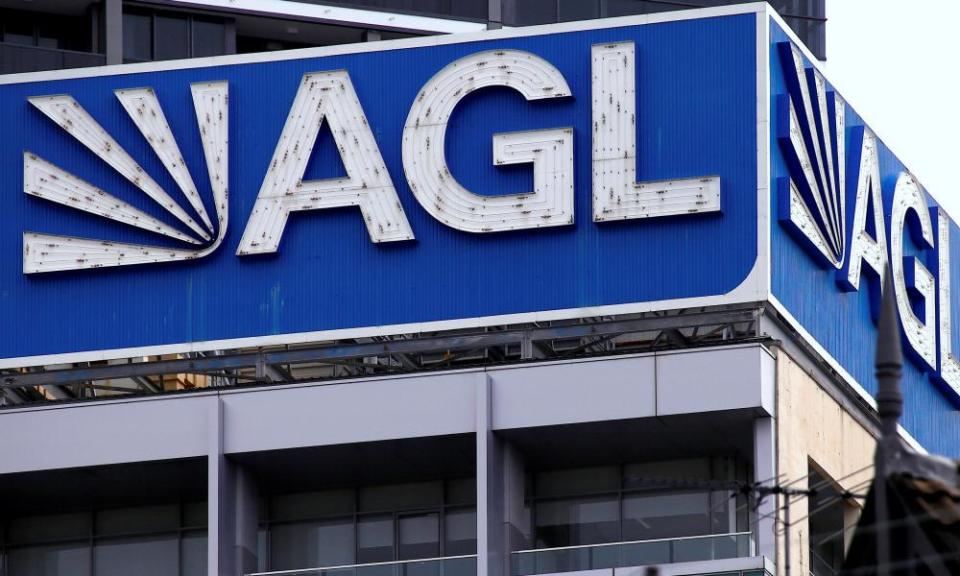AGL says it will link bosses’ bonuses to lowering emissions

Australia’s largest domestic emitter of greenhouse gases, the energy provider AGL, is the first major company in the country to link managers’ bonuses to lowering emissions.
AGL announced on Tuesday that metrics including the amount of power the company generated from renewable sources would be linked to the pay incentives of key managers from the next financial year, starting in July 2021.
Related: Snowy Hydro 2.0 wins final federal 'thumbs-up' – despite environmental fears
Brett Redman, AGL’s chief executive, said the move was introduced “to hold ourselves accountable” as the company worked towards a target of net-zero emissions by 2050.
In 2018-19, the company declared it had emitted greenhouse gases equivalent to 42.7m tonnes of CO2, mostly from burning coal and gas in power plants.
That amount was more than double the 20.1 Mt from the next largest emitter, EnergyAustralia.
AGL announced a new climate statement on Tuesday and, from Wednesday, Redman said customers would be given the option to pay extra on their bills for “carbon-neutral” electricity. That scheme would be rolled out to all AGL’s products in the future, Redman said.
Using a government-accredited scheme, AGL customers could choose to pay $1 a week to have the greenhouse gas emissions from their electricity offset. Small businesses would pay $4 a week.
AGL would initially invest in two schemes to offset the emissions from customers’ electricity use – a forestry program in northern New South Wales and a project in Kenya to replace charcoal ovens with lower-emission alternatives.
The company did not alter the established timeline for the retirement of its main coal-fired power stations.
Redman said the new climate statement did not change the company’s previously announced plans to retire its three-main coal-fired power plants, meaning that Loy Yang power station in Victoria’s Latrobe Valley would keep burning coal for 28 years.
But he said the company was being driven by the demands of its customers and, if there was high demand for carbon-neutral products, it may revisit its timeline to close the coal plants.
More rapid developments in cleaner technologies could also see the company close its coal assets earlier.
In a briefing to reporters, Redman said AGL would link one-third of the company’s longer-term incentive pay scheme for its 50 or so senior managers to emissions reductions and sales of carbon-neutral energy.
Details would be announced at the company’s annual general meeting in September, Redman said. He believed AGL was the first top-50 ASX company to link remuneration to emissions reductions.
Last week Australia’s major electricity and gas companies – members of the Australian Energy Council – called on the government to back a target of reaching net-zero greenhouse gas emissions by 2050.
According to a report in the Australian, one council member, Intergen, with coal plants in Queensland, said the call could antagonise the federal government, which has only committed to a net-zero goal sometime before 2100.
The AGL investor First State Super, which has $120bn of funds under management, has been a lead negotiator with AGL on behalf of Climate Action 100+, a group of global investors worth US$40tn.
Liza McDonald, head of responsible investment at First State Super, which owns about 1% of AGL, welcomed the move to link remuneration to climate-related targets.
“We are having regular and constructive engagements with AGL and are seeing real progress from the company in strengthening their climate risk analysis,” she said.
“We will continue to engage with AGL and other heavy greenhouse gas emitters to understand and influence how they are preparing for a more rapid transition to a low-carbon economy.”
Related: Energy retailers at risk due to nonpaying customers and higher costs during pandemic
But one climate campaign group, the Australasian Centre for Corporate Responsibility, rubbished AGL’s announcement
Dan Gocher, the centre’s director of climate and environment, said closing coal plants “at their use-by dates” was not consistent with the Paris climate change agreement, “with which AGL claims it is aligned”.
“AGL has made no new commitments other than offering carbon offsets to its retail customers,” Gocher said. “Offsets are no substitute for simply not producing emissions in the first place.
“While AGL’s intention to reward executives to reduce emissions is welcome, and consistent with ACCR’s asks of other heavy polluters, executives must not be rewarded for business as usual.”

 Yahoo Finance
Yahoo Finance 